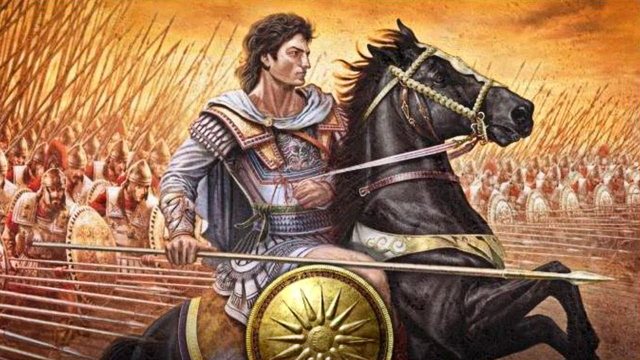
The Suspicions and Intrigues That Tore Down Alexander the Great's Empire


Alexander the Great’s achievements in the 4th century BCE were impressive. The son of a powerful king and an ambitious queen, he was born in 356 BCE. He studied under the renowned philosopher Aristotle until the age of 16, and became king of Macedonia at the age of 20.
During his 13-year reign, Alexander united ancient Greece, conquered Persia, and created an empire that stretched from Europe to Asia. He imagined himself a descendant of Achilles, and son of Zeus. As Alexander's power grew, so did his fear of losing what he had achieved.
At times megalomaniac and at times paranoid, Alexander began to see danger everywhere, including in those closest to him. He believed that he was envied, and that everyone wanted his power. He thought that they wanted him dead. Alexander's brilliant start to his career brought him many loyal comrades-in-arms who helped him in his rapid rise to glory.
In 334 BCE, Alexander's forces advanced unopposed throughout Anatolia (modern-day Turkey) and conquered the Achaemenid (Persian) Empire. After rejecting an offer of truce from Darius III of Persia, Alexander entered Persian-controlled Egypt in 332 BCE.
He was welcomed as a liberator by the Persian rulers, and founded Alexandria, the most famous city that would bear his name. On his journey deep into the desert near the modern-day border with Libya, Alexander had a divine vision that only further fueled his sense of omnipotence.
The young king and his men crossed the desert to the Siwa Oasis, home of the oracle of Amun—whom the Greeks associated with Zeus—whose priests proclaimed him the Son of God. After defeating Darius at Gaugamela, Alexander was warmly welcomed in Babylon by Mazeus, the local Persian tyrant.
Although Alexander considered Babylon the seat of his new government in Asia, he allowed Mazeus to continue in his position, with some limited powers. This decision was essential to Alexander's consolidation of power, but some of his Macedonian supporters resented Mazeus, who had fought against them at the Battle of Gaugamela.
That incident marked the beginning of a trend that would continue: Alexander built a parallel court with the Asiatics, observed local rituals, and even married a Bactrian princess, Roxane. His older Macedonian companions, who had fought for Alexander’s father, Philip II, began to distance themselves from these behaviors. They even began to plot to assassinate the king.
Parmenidi kishte qenë krahu i djathtë i babait të Aleksandrit, dhe më pas shërbeu si zv/komandant në ushtrinë e tij. Ai gëzonte lidhje të ngushta me oborrin dhe ushtrinë. Tashmë në të 70-tat, Parmenidi kishte disa djem që shërbenin nën urdhrat e Aleksandrit. Më i madhi prej tyre, Filotasi, ishte ndoshta më i shquari.
Aleksandri e kishte zgjedhur atë të komandonte kalorësinë, një trupë elite e formuar tërësisht nga pjesëtarët e fisnikërisë maqedonase. Filotasi kishte reputacionin e një trimi, punëtori të madh, si dhe atë të një miku bujar dhe besnik. Por disa mendonin se ai ishte arrogant, sillej në mënyrë të dyshimtë, dhe qe ndoshta ziliqar për arritjet e Aleksandrit.
Ata urdhëruan spiunët e tyre ta mbanin nën vëzhgim, por dëshmia e vetme e tradhtisë së tij u gjet nga një prostitutë greke. Ajo u tha atyre se Filotasi i kishte thënë në konfidencë, se si ai dhe Parmenidi kishin meritat për fitoret e Aleksandrit.
Kraterusi ia raportoi këtë Aleksandrit, i cili nuk i dha shumë peshë një bisede krevati. Ai i besonte Filotasit, dhe nuk donte të konfliktohej me Parmenidin, të cilit i kishte besuar prej një kohe të gjatë. Në vitin 330, zërat zbuluan një tjetër komplot të Filotasit.
Ndërsa dimëronte me ushtrinë e tij në Frada (Farah-un e sotëm në Afganistan), Aleksandri mësoi se një njeri me emrin Dimnus, kishte planifikuar ta vriste. Një informator, i kishte treguar dy herë Filotasit për komplotin, por ky nuk kishte bërë asgjë. Në fund, ai shkoi dhe u rrëfye direkt tek Aleksandri.
Para se të arrestohej, Dimnusi vrau veten, duke lënë shumë mistere të pazgjidhura. Pasi nisi të dyshojë për mikun e tij, Aleksandri i bëri thirrje Filotasit të shpjegohej se pse nuk e kishte raportuar komplotin tek udhëheqësi i tij. Ky i fundit mohoi të ishte pjesë e një komploti për të vrarë mbretin.
Në fund Filotasi ra dakord që të ishte ushtria, ajo që do të përcaktonte fatin e tij. Pas dëgjimit të të gjitha provave, ushtria e shpalli Filotasin fajtor për tradhëti, dhe e dënoi me vdekje. Rrethi i brendshëm i Aleksandrit, ishte shumë i shqetësuar nga ambiciet dhe xhelozitë, për ta lënë çështjen të përfundonte vetëm me vdekjen e Filotasit.
Hefesti, miku më i ngushtë i Aleksandrit, propozoi që ta torturonin të dënuarin përpara se ta ekzekutonin, me qëllim që të zbulonin se kush tjetër ishte i përfshirë në komplot. Pasi u torturua gjithë natën, Filotasi u dorëzua dhe u rrëfye, dhe të nesërmen u qëllua me gurë për vdekje.
Nga ai moment, radhët e ushtrisë thjesht u spastruan, duke mos lënë askënd të dyshuar për mungesë besnikërie. Por pas ekzekutimit të Filotasit, Aleksandri filloi atë që disa studiues besojnë se është vepra e tij më e errët.
Alexander, perhaps paranoid, believed that there was no way Philotas could have plotted against him without the knowledge of his father, Parmenides. He also knew that the latter might act against him to avenge his son's death. Parmenides was tasked with managing much of the empire's wealth and strategic supply lines.
Some historians have even suggested that the plot against Philotas was concocted as an excuse to remove his father from power. Parmenides was in Ecbatana, a former summer residence of the Persian kings. Sources report that before his assassination, he knew nothing of his son's terrible fate. He was killed by a courier sent by Alexander.
The king meanwhile sent a small contingent of soldiers to Ecbatana, to suppress any rebellion that might ensue among Parmenides' troops. But the deaths of two of his most trusted advisors did not appease Alexander, whose character continued to deteriorate in the years to come.
He continued to adopt what the Macedonians saw as Persian manners. Alexander's feasts were characterized by great moral debauchery. The most notorious banquet was held at Maracanda, where a debate broke out between him and Clytemnestra, one of his most loyal generals, over whether or not to invade India.
Enraged by Cleitus' accusations, Alexander publicly killed him with a spear. Afterward, he expressed great remorse. Alexander's actions did little to quell the internal dissension among his followers, and other conspiracies were organized.
In 326 BCE, after reaching India at the Hyphasis (Beas) River, Alexander's men rebelled. The king was forced to retreat west, and from that moment his reign went into a steady decline. Three years later, Alexander died of a fever in Babylon at the age of 32./ Bota.al

ideas
top
Alfa recipes
TRENDING 
services
- POLICE129
- STREET POLICE126
- AMBULANCE112
- FIREFIGHTER128



























